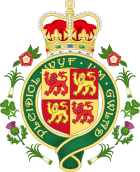Well-being of Future Generations (Wales) Act 2015
| Act of the National Assembly for Wales | |
 | |
| Long title | An Act of the National Assembly for Wales to make provision requiring public bodies to do things in pursuit of the economic, social, environmental and cultural well-being of Wales in a way that accords with the sustainable development principle; to require public bodies to report on such action; to establish a Commissioner for Future Generations to advise and assist public bodies in doing things in accordance with this Act; to establish public services boards in local authority areas; to make provision requiring those boards to plan and take action in pursuit of economic, social, environmental and cultural well-being in their area; and for connected purposes. |
|---|---|
| Citation | 2015 anaw 2 |
| Introduced by | Jeff Cuthbert |
| Territorial extent | Wales |
| Dates | |
| Royal assent | 29 April 2015 |
| Commencement | April 2016 |
| Other legislation | |
| Relates to | Government of Wales Act 2006 |
Status: Current legislation | |
| History of passage through Parliament | |
| Text of statute as originally enacted | |
The Well-being of Future Generations (Wales) Act 2015 (anaw 2) (Welsh: Deddf Llesiant Cenedlaethau'r Dyfodol (Cymru) 2015) is an Act of the National Assembly for Wales that was given royal assent on 29 April 2015; it came into force in April 2016.[1] It set out seven well-being goals: i) a prosperous Wales, ii) a resilient Wales, iii) a healthier Wales, iv) a more equal Wales, v) a Wales of cohesive communities, vi) a Wales of vibrant culture and thriving Welsh language and vii) a globally responsible Wales. A 'sustainable development principle' comprising five aspects is intended to assist in the delivery of the Act's goals and actions; i) long-term thinking, ii) prevention, iii) integration, iv) collaboration and v) involvement. [2]
Application
The Act places duties upon the following bodies operating within Wales:
- Welsh ministers
- local authorities
- local health boards
- Public Health Wales NHS Trust
- Velindre NHS Trust
- national park authorities
- fire and rescue authorities
- Natural Resources Wales
- The Higher Education Funding Council for Wales
- The Arts Council of Wales
- Sports Council of Wales
- National Library of Wales
- National Museum of Wales
Parts
The Act has five main parts and is supported by four schedules:[3]
- Part 1: Introduction
- Part 2: Improving well-being
- Part 3: The Future Generations Commissioner for Wales
- Part 4: Public Services Boards
- Part 5: Final Provisions
Part 1 Introduction
Part 1 of the Act provides an overview.
Part 2 Improving well-being
This part of the Act sets out well-being objectives for Welsh ministers and a duty on public bodies to pursue them also. It describes how performance towards achieving the goals should be measured and provides guidance.
Part 3 The Future Generations Commissioner for Wales
Part 3 of the Act sets out the role of a Future Generations Commissioner which includes a duty to review and make recommendations and sets up a panel to advise the Commissioner. The first Commissioner was Sophie Howe, appointed in 2016 to be in post until 2023.
Part 4 Public Services Boards
Part 4 of the Act establishes public services boards and places a well-being duty upon them. It describes the preparation and review of local well-being plans.
Part 5 Final Provisions
Part 5 of the Act defines public bodies in the context of the legislation, and sets out regulations and other ancillary matters.
Schedule 1
Annual reports by other public bodies
Schedule 2
The Future Generations Commissioner for Wales
Schedule 3
Public Services Boards: Further provision
Schedule 5
Public Services Boards: Consequential amendments and repeals
See also
References
- ^ "Well-being, Wales". The Gazette Official Public Record. 22 July 2016. Retrieved 31 May 2017.
- ^ "Well-being of Future Generations (Wales) Act 2015" (PDF). 17 June 2015. Retrieved 31 May 2019.
- ^ "Well-being of Future Generations (Wales) Act 2015". legislation.gov.uk. The National Archives. Retrieved 31 May 2019.
